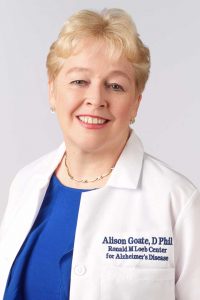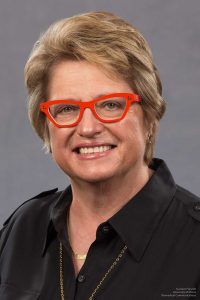On September 22, 2020, The Alzheimer’s Association and the National Institute for Aging hosted a virtual symposium on disease genes and heredity, aimed at a wide audience that includes basic scientists, translational medicine, and clinicians. Talks included discussions centered around global Alzheimer’s research, identified genetic pathways, why they are significant, and the implications of these findings for clinicians and public health. The purpose of this symposium was to inform the AD community of advancements in global Alzheimer’s genetics and molecular biology and to foster dialogue about the use of these findings in clinical practice and translational research.
Agenda & Webinars
Watch 45+ presentations and a Q&A discussion from global experts in the field of AD genetics.
Organizing Committee
Elizabeth Blue, Ph.D.

Dr. Blue is an associate professor in the Division of Medical Genetics within the Department of Medicine at the University of Washington, where she is a member of the Institute for Public Health Genetics faculty and an assistant director of the Washington State Twin Registry. She is also a Fellow Member of the International Genetic Epidemiology Society, currently serving on the Communications Committee. She received her Ph.D. in Anthropology at the University of Utah, with a focus on population genetics, followed by postdoctoral training in statistical genetics at the University of Washington. Dr. Blue’s research incorporates tools from population genetics and genetic epidemiology to detect genetic variants or regions of the genome influencing disease. Her long-term research goals are to identify variants influencing disease within and between human populations, as well as to predict and evaluate their functions. While her lab focuses on genetic modifiers of Alzheimer’s disease, she is highly collaborative with leadership roles in the Alzheimer’s Disease Sequencing Project, the Cystic Fibrosis Genome Project, the University of Washington Center for Mendelian Genomics and the Pacific Northwest Undiagnosed Diseases Network.
Alison Goate, DPhil

Dr. Goate is the Willard TC Johnson Professor of Neurogenetics and the director of the Ronald M. Loeb Center for Alzheimer’s Disease at the Icahn School of Medicine at Mount Sinai in New York. She has worked on Alzheimer’s disease since 1987. Whilst in John Hardy’s lab, she reported the first mutation to cause familial Alzheimer’s disease. Since then she has been part of many gene finding teams identifying disease causing variants for AD and FTD. She was elected a member of the National Academy of Medicine in 2016. Dr. Goate is also a leader in the study of late-onset AD genetics using both GWAS and sequencing approaches. Her team led the identification of rare variants in PLD3 as a risk factor for AD and collaborated with John Hardy in the identification of Trem2 as an AD risk factor. More recently her work on common variants has highlighted the importance of microglial expressed genes in AD risk, identifying SPI1/Pu.1 as an important regulator of AD risk genes. Fine mapping of AD risk loci has identified causal genes/variants in many loci and further emphasized the importance of microglial gene expression and function to AD risk. Dr. Goate has received the Potamkin Award, the Khalid Iqbal Lifetime Achievement Award from the Alzheimer’s Association and the MetLife Award for her research on AD. She was elected a fellow of AAAS in 2012 and a fellow of the National Academy of Medicine in 2016.
Margaret A. Pericak-Vance, Ph.D.

Dr. Pericak-Vance is the director of the John P. Hussman Institute for Human Genomics and the executive vice chair of the Dr. John T. Macdonald Foundation Department of Human Genetics at the University of Miami Miller School of Medicine. Board certified by the American Board of Medical Specialties in Medical Genetics, she is a founding fellow of the American College of Medical Genetics and an elected member of the National Academy of Medicine. Her productivity in genetics research has resulted in more than 725 peer-reviewed papers. Dr. Pericak-Vance’s laboratory made the seminal discovery of the first association of a common genetic risk variant, the apolipoprotein ε4 allele (APOE-4) for late-onset Alzheimer disease, followed closely by the identification of the APOE-2 allele as a genetic protective variant for Alzheimer disease. Many of Dr. Pericak-Vanceʹs efforts are directed towards addressing health disparities in genomics research. She directs several related genetic research projects, one on Alzheimer disease in African Americans and a second on admixed Caribbean Hispanic and Amerindian populations. Dr. Pericak-Vance is the recipient of numerous awards, including the international ʺLouis Dʺ Scientific Prize from the Institut de Franceʹs Academie des Sciences for her Alzheimer’s disease research, the Bengt Winblad Lifetime Achievement Award from the Alzheimerʹs Association and the Snow and Ming Tsuang Lifetime Achievement Award from the International Society of Psychiatric Genetics (ISPG) for her lifelong contribution to psychiatric disease research.
Badri N. Vardarajan, Ph.D.

Dr. Vardarajan is a bioinformatics scientist with over ten years of experience in the multi-institutional studies of genetics of Alzheimer’s disease. He obtained his Ph.D. in bioinformatics from Boston University and is currently a faculty member at Columbia University’s Department of Neurology. Dr. Vardarajan has done extensive work in implementing computational approaches to gene discovery in AD. He is one of the principal investigators of the Alzheimer’s Disease Sequencing Project-Follow-Up Study (ADSP-FUS), with the goal of whole genome sequencing ~20,000 Alzheimer’s disease patients and matched controls from minority cohorts to understand the genetic architecture of Alzheimer’s disease. He also co-leads AD multi-omics study to integrate genetic, transcriptomic, proteomic and metabolomics data for gene and pathway discovery in Caribbean Hispanic families.
Elizabeth Blue, Ph.D.

Dr. Blue is an associate professor in the Division of Medical Genetics within the Department of Medicine at the University of Washington, where she is a member of the Institute for Public Health Genetics faculty and an assistant director of the Washington State Twin Registry. She is also a Fellow Member of the International Genetic Epidemiology Society, currently serving on the Communications Committee. She received her Ph.D. in Anthropology at the University of Utah, with a focus on population genetics, followed by postdoctoral training in statistical genetics at the University of Washington. Dr. Blue’s research incorporates tools from population genetics and genetic epidemiology to detect genetic variants or regions of the genome influencing disease. Her long-term research goals are to identify variants influencing disease within and between human populations, as well as to predict and evaluate their functions. While her lab focuses on genetic modifiers of Alzheimer’s disease, she is highly collaborative with leadership roles in the Alzheimer’s Disease Sequencing Project, the Cystic Fibrosis Genome Project, the University of Washington Center for Mendelian Genomics and the Pacific Northwest Undiagnosed Diseases Network.
Alison Goate, DPhil

Dr. Goate is the Willard TC Johnson Professor of Neurogenetics and the director of the Ronald M. Loeb Center for Alzheimer’s Disease at the Icahn School of Medicine at Mount Sinai in New York. She has worked on Alzheimer’s disease since 1987. Whilst in John Hardy’s lab, she reported the first mutation to cause familial Alzheimer’s disease. Since then she has been part of many gene finding teams identifying disease causing variants for AD and FTD. She was elected a member of the National Academy of Medicine in 2016. Dr. Goate is also a leader in the study of late-onset AD genetics using both GWAS and sequencing approaches. Her team led the identification of rare variants in PLD3 as a risk factor for AD and collaborated with John Hardy in the identification of Trem2 as an AD risk factor. More recently her work on common variants has highlighted the importance of microglial expressed genes in AD risk, identifying SPI1/Pu.1 as an important regulator of AD risk genes. Fine mapping of AD risk loci has identified causal genes/variants in many loci and further emphasized the importance of microglial gene expression and function to AD risk. Dr. Goate has received the Potamkin Award, the Khalid Iqbal Lifetime Achievement Award from the Alzheimer’s Association and the MetLife Award for her research on AD. She was elected a fellow of AAAS in 2012 and a fellow of the National Academy of Medicine in 2016.
Margaret A. Pericak-Vance, Ph.D.

Dr. Pericak-Vance is the director of the John P. Hussman Institute for Human Genomics and the executive vice chair of the Dr. John T. Macdonald Foundation Department of Human Genetics at the University of Miami Miller School of Medicine. Board certified by the American Board of Medical Specialties in Medical Genetics, she is a founding fellow of the American College of Medical Genetics and an elected member of the National Academy of Medicine. Her productivity in genetics research has resulted in more than 725 peer-reviewed papers. Dr. Pericak-Vance’s laboratory made the seminal discovery of the first association of a common genetic risk variant, the apolipoprotein ε4 allele (APOE-4) for late-onset Alzheimer disease, followed closely by the identification of the APOE-2 allele as a genetic protective variant for Alzheimer disease. Many of Dr. Pericak-Vanceʹs efforts are directed towards addressing health disparities in genomics research. She directs several related genetic research projects, one on Alzheimer disease in African Americans and a second on admixed Caribbean Hispanic and Amerindian populations. Dr. Pericak-Vance is the recipient of numerous awards, including the international ʺLouis Dʺ Scientific Prize from the Institut de Franceʹs Academie des Sciences for her Alzheimer’s disease research, the Bengt Winblad Lifetime Achievement Award from the Alzheimerʹs Association and the Snow and Ming Tsuang Lifetime Achievement Award from the International Society of Psychiatric Genetics (ISPG) for her lifelong contribution to psychiatric disease research.
Badri N. Vardarajan, Ph.D.

Dr. Vardarajan is a bioinformatics scientist with over ten years of experience in the multi-institutional studies of genetics of Alzheimer’s disease. He obtained his Ph.D. in bioinformatics from Boston University and is currently a faculty member at Columbia University’s Department of Neurology. Dr. Vardarajan has done extensive work in implementing computational approaches to gene discovery in AD. He is one of the principal investigators of the Alzheimer’s Disease Sequencing Project-Follow-Up Study (ADSP-FUS), with the goal of whole genome sequencing ~20,000 Alzheimer’s disease patients and matched controls from minority cohorts to understand the genetic architecture of Alzheimer’s disease. He also co-leads AD multi-omics study to integrate genetic, transcriptomic, proteomic and metabolomics data for gene and pathway discovery in Caribbean Hispanic families.
